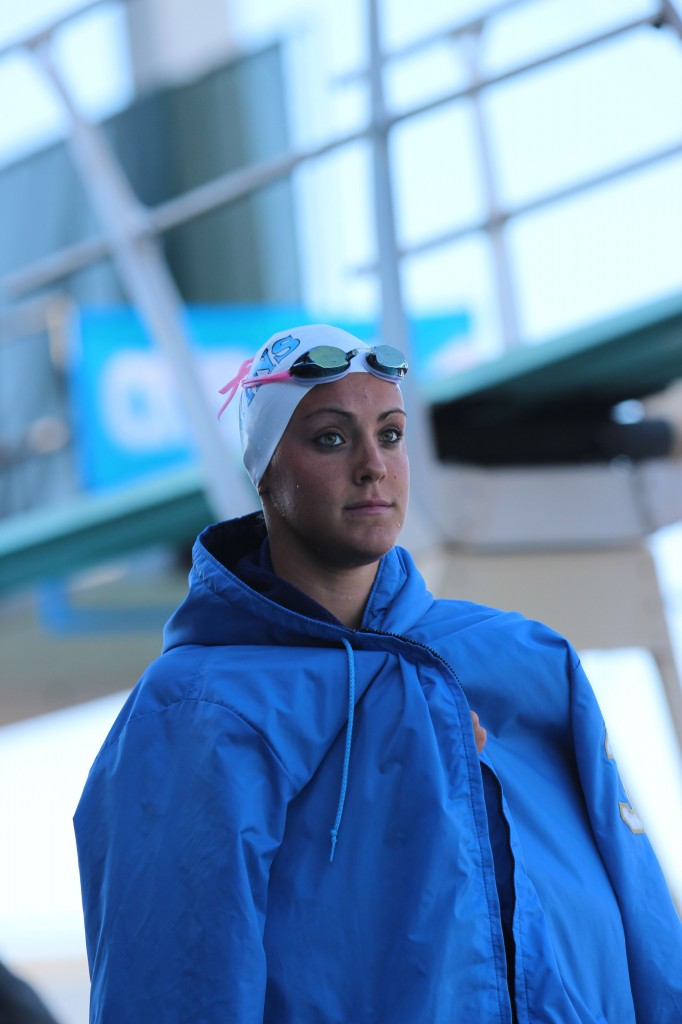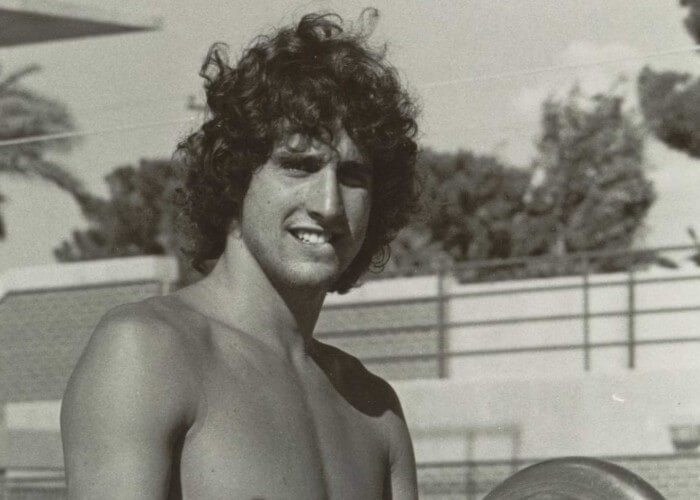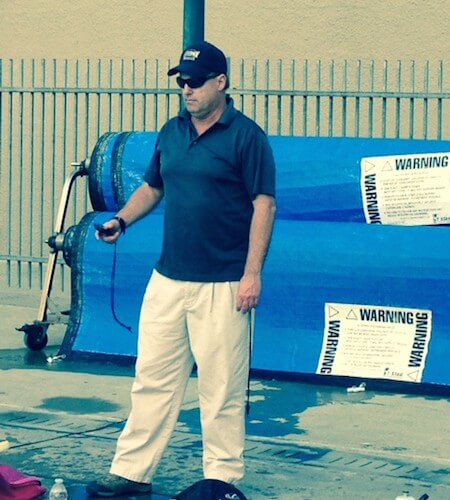Coach It Forward: “Bootstrap” Brian Bolster

By Annie Grevers, Swimming World Staff Writer
Osprey Aquatics head coach Brian Bolster hated swimming as a 9-year-old.
“There was not much coaching and no emphasis on technique on my big team,” Bolster said. “So eventually, I quit.”
So how did Bolster find his feet planted firmly and happily on a pool deck 40 years later?
A year after he quit swimming, his mom walked into a room where four of her seven children were lounging around watching cartoons after school. “Enough of this,” Bolster’s mom said. With that, she signed her kiddos up for a new swim team, armed with energetic, caring coaches.
“I loved that if I showed up and worked hard, I would eventually get faster,” Bolster said.
As a 16-year-old, Bolster encountered Rick DeMont at a meet. DeMont was the rightful 1972 Olympic champion in the 400 free who was making a comeback in 1978. Always in pursuit of excellence, Bolster latched onto the veteran 26-year-old and listened as the sage let swimming knowledge flow forth.
“Every great swim you’ve ever done is inside you,” DeMont said to Bolster. “Just dip into your reservoir.”
And just after this wisdom was imparted, DeMont said “I’m going to go win this 100 free.” And he did.
At the time, DeMont was not training much yardage at all, and Bolster was blown away by how mentally equipped his hero was.
Bolster went from being the worst swimmer on his former team as a 9-year-old to the best on his new team. He qualified for Junior Nationals as an 18-year-old and calls himself a “bootstrap-type kid” who worked for every inch of progress in the sport.
A LIFE CHANGER
In 1984, just before Olympic Trials, Bolster was in a serious jet ski accident. He crushed nerves in both legs and was almost an amputee. He couldn’t walk. The active, healthy young man was bed-ridden from the nerve damage for the following four years.
“I was not able to work and dealt with daily pain until the summer of 1994,” Bolster said.
When he had the aftermath of his injuries stabilized, he found coaching. He was able to make more than minimum wage and found passion on the pool deck. Talk swimming with Bolster for 60 seconds and you’ll hear his love for the sport seep out of every word.
“I continued to go watch the Santa Clara International meet every summer (while recovering from the accident),” Bolster said.
In 1994, he situated himself on the pool deck next to legendary swimming mind Richard Quick.
“I listened to him talk to his swimmers and it sounded like a foreign language to me,” Bolster said.
After gaining exposure to Quick’s fresh outlook, Bolster wanted to soak up more. He became a student of swimming.
He was magnetized to coaching greats like Nort Thornton, Dave Salo, Skip Kenney, and Bob Bowman. He scribbled notes like mad at various coaching clinics and continues to garner as much swim data as possible.
CEREBRAL COACHING
In 1996, Bolster started up Osprey Aquatics in the San Jose area. One of Bolster’s assets as a coach comes from his experience being both the slowest and the fastest kid on his teams. He can relate to just about any swimmer.
In high school, Bolster recalls the “how” and “why” of strokes never being mentioned.
“I remember one coach explaining how to do an ‘S’ pull in freestyle and thinking, ‘I’m not going to do that.'”
Bolster had an early awareness that not enough emphasis was placed on technique. His mom, who was not a swimmer, would give him basic technical hints- “It looks like this when you swim well,” while acting out her amateur dryland swimming.
Bolster’s coaching philosophy in a nut shell? We could call it speed maintenance. Bolster has given presentations at ASCA Conventions, speaking on how to best ingrain a race pattern into swimmers’ heads. It all comes down to stroke count, according to Bolster.
“Pattern your race, then race your pattern,” Bolster spits out another swimming proverb.
Linnea Mack, now a big hitter for UCLA, trained with Bolster in high school. In 2011, Mack was a 56.1 100 flyer. In the summer of 2012, Mack took the crown in the 100 fly at Junior Nationals, chopping over three seconds off her time from the previous year. She sizzled in at a 53.02.
Bolster counted Mack’s strokes in 2011. In her race by 25, her stroke counts were 5-7-8-9. Bolster saw a huge opportunity for improvement just by focusing on Mack’s last 50. The next season, Mack never trained over a 75 fly at 100-pace, and always stuck with 12 kicks underwater with seven strokes off each wall.
After her win at 2012 Juniors, Mack said, “I just did what I do in practice.”
The mental side of Bolster’s coaching is rational and poetic. Swimmers need to determine what they believe about themselves in order to find purpose and give meaning to their sacrifice, he says.
The cerebral side of swimming is what gets Bolster fired up. He would love to eventually work with post-graduate athletes who have reached such a high level that cerebral swimming is a necessity for progress.
INVENTIVE MINDS
Bolster was nominated* by Tucson Ford Aquatics head coach Paul Stafford. Both coaches hold one another in high esteem. They bonded throughout their years on deck at California club meets and would sometimes room together on travel trips. Bolster would bring a few athletes to meets, while Stafford typically had a large posse of stellar age group swimmers traveling during his time with the Terrapins.
“Most head coaches have pretty big egos,” Bolster said. “But Paul has always been the most gracious, down-to-earth, never-one-upping coach.”
In many ways, they’re like-minded. In their humility and in their ingenuity. Stafford invented the “wrist lock” device for a swimmer to receive vibrational feedback with an incorrect catch position. Bolster has a patented product called the Bolster paddle sold by FINIS, which does not allow the wrist to bend and forces a high elbow, and vertical forearm for the optimal freestyle pull pattern.
SWIMMER TAUGHT
At Osprey Aquatics, the team has something called the Osprey Way. Smarter versus farther is the name of the game with Osprey swimmers. Bolster also recognizes that he and the other coaches are not the sole architects of their swimmers’ strokes. He learns as much from his athletes as they take from him, so Bolster says.
Bolster is a highly-intelligent, analytical coach with a burning desire to know everything about every angle of every stroke. Don’t be surprised if we someday hear Bolster listed among those he considers coaching legends.
*Coach it Forward is a weekly column devoted to acquainting the swim world with some of the fantastic coaches in our great nation. The selection for the next featured coach is made by this week’s subject. The nomination process serves as a way for coaches to pat each other on the back and for the rest of us to learn the coaching philosophy and passions of each distinctly influential coach.





